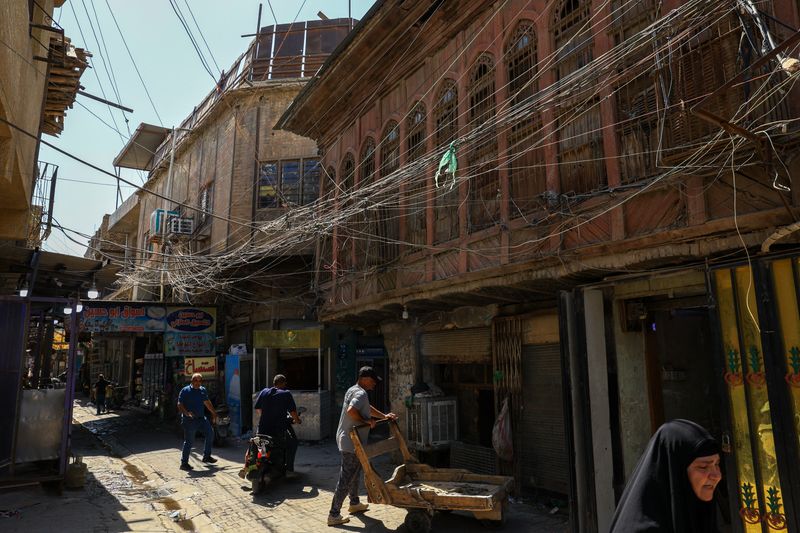By Maha El Dahan and Muayad Hameed
DUBAI/BAGHDAD (Reuters) – Iraq’s attempt to ease its chronic power shortage with gas from Turkmenistan routed through neighbouring Iran has failed under U.S. pressure, leaving Baghdad scrambling for alternatives to keep the lights on.
Oil-rich Iraq has struggled to provide its citizens with power since the 2003 U.S.-led invasion that toppled Saddam Hussein, forcing many to rely on expensive private generators, causing economic hardship and sparking social unrest.
Hussain Saad, a 43-year-old owner of a butcher shop in the Kasra neighbourhood of Baghdad, is struggling to protect his livelihood and keep his meat from spoiling in the scorching heat.
“This isn’t just my suffering — it’s the suffering of the entire Iraqi people,” he said.
A deal first proposed in 2023 would have seen Turkmenistan export gas to Iraq through Iran, which lies between the two countries. Under the swap deal, Iran would receive the gas and supply it to Iraq, but this risked violating U.S. sanctions on Tehran – requiring Washington’s approval.
That approval never came. U.S. President Trump‘s administration has doubled down on a “maximum pressure” campaign against Tehran.
CAUGHT BETWEEN TWO ALLIES
Reuters spoke to four Iraqi officials and reviewed seven official documents to reveal how Baghdad had sought Washington’s approval for months to let it import roughly 5 billion cubic metres (bcm) of Turkmen gas via Iran.
Iraq sought to import 5.025 bcm of Turkmen gas a year, facilitated via Iran’s state-owned National Iranian Gas Company (NIGC), according to a draft contract of the swap deal seen by Reuters.
Iran would receive no money, but would get gas for its own needs amounting to no more than 23% of the overall daily volume coming from Turkmenistan, a document showed.
Baghdad also offered to allow a third-party international monitor to oversee the deal’s compliance with U.S. sanctions and anti-money laundering rules, the same document showed.
But despite months of lobbying, U.S. objections ultimately scuppered the deal as Washington ramps up pressure on Iran over its nuclear plans.That has left Baghdad facing an increasingly difficult balancing act between its main allies in Washington and Tehran.
“Proceeding (with the Turkmen deal) could trigger sanctions on Iraqi banks and financial institutions, so the contract is currently suspended,” Adel Karim, adviser to Iraq’s prime minister for electricity affairs, told Reuters.
The U.S. Treasury declined to comment but a U.S. source familiar with the matter said the Trump administration would not approve arrangements that could benefit Iran, though it was working with Iraq on its energy needs.
The Iranian government, oil ministry, NIGC and Turkmen foreign ministry did not respond to Reuters requests for comment.
IRAQ’S RELIANCE ON IRANIAN GAS
Iraq has relied on gas and power imports from Iran for the past decade. Iranian gas covers nearly a third of Iraq’s power generation and in 2024 gas imports reached 9.5 bcm, said an Iraqi power official, who asked not to be named due to the sensitivity of the issue.
“If we lose Iranian gas, we’ll face a serious problem in electricity generation,” Karim said.
Although Iraq is OPEC’s second-largest oil producer, it burns off much of the gas it produces alongside oil due to under-investment and lack of infrastructure to capture and process it.
The country extracted just 11 bcm of gas in 2023 that could be used for power or industrial needs, according to the IEA. Iraq’s gas needs vary seasonally, with demand surging in summer to around 45 million cubic metres (mcm) per day, Karim said, otherwise dropping to 10–20 mcm per day.
SANCTIONS SCUPPER TURKMEN DEAL
In March, the Trump administration ended a sanctions waiver that since 2018 had allowed Iraq to pay for Iranian power, curtailing imports.
The lack of gas supplies from Iran led to a loss of about 3,000 megawatts of power generation since the waivers ended and peak summer demand set in – more than 10% of Iraq’s roughly 28,000 megawatts of total capacity, Karim said, enough to impact around 2.5 million homes according to Iraqi electricity officials.
Baghdad hoped to diversify its supply and avoid the risk of breaching sanctions with the Turkmen deal, sources said and documents showed.
Failing to secure that deal could jeopardise Baghdad’s ability to sustain gas plants during peak summer demand, Iraq’s electricity ministry warned in a letter to state-owned Trade Bank of Iraq (TBI) on May 27, three months prior to a nationwide blackout in August.
DIVERSIFICATION THROUGH LNG, QATAR
With the Turkmen route blocked, Iraq is exploring alternatives to plug its power needs gap, including building infrastructure to import liquefied natural gas (LNG) from Qatar.
Hamza Abdul Baqi, head of the state-owned South Gas Company, told Reuters in March that Iraq would lease a floating LNG terminal to handle Qatari and Omani gas. The government had tasked the oil ministry with finding alternatives to Iranian gas in case the U.S. decided to restrict it, he said.
The country has also signed deals with global oil majors such as TotalEnergies, BP and Chevron over the past two years to speed up its gas projects.
French oil major TotalEnergies said this week it has launched the second development phase at Iraq’s Ratawi field, the final stages of a $27 billion project that aims to boost Iraq’s oil, gas and power production.
Britain’s BP said in March it has received final government approval for the redevelopment of Iraq’s giant Kirkuk oilfields, with an initial plan to produce 3 billion barrels of oil equivalent.
“We’re expanding our gas-fired power plants,” Karim said. “We’ll need more gas and more sources.”
(Reporting by Maha El Dahan in Dubai and Muayed Hameed in Baghdad; additional reporting by Ahmed Rasheed and Maher Nazeh in Baghdad, Andrea Shalal in Washington and Marat Gurt in Ashgabat; writing by Yousef Saba; editing by Elaine Hardcastle)



Leave a Comment
Your email address will not be published. Required fields are marked *